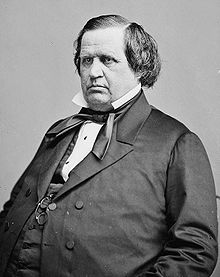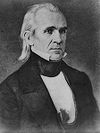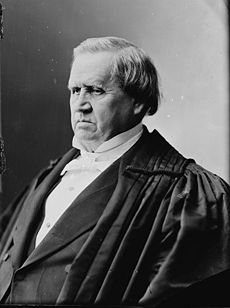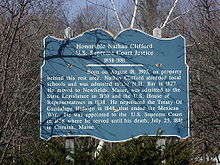- Nathan Clifford
-
Nathan Clifford 
19th United States Attorney General In office
October 17, 1846 – March 17, 1848President James K. Polk Preceded by John Y. Mason Succeeded by Isaac Toucey Associate Justice of the Supreme Court of the United States In office
January 12, 1858[1] – July 25, 1881Nominated by James Buchanan Preceded by Benjamin Robbins Curtis Succeeded by Horace Gray Personal details Born August 18, 1803
Rumney, New HampshireDied July 25, 1881 (aged 77)
Cornish, MainePolitical party Democratic Spouse(s) Hannah Ayer Profession Lawyer, Politician, Teacher, Judge Religion Congregationalist; later Unitarian Nathan Clifford (August 18, 1803 – July 25, 1881) was an American statesman, diplomat and jurist.
Clifford was born of old Yankee stock in Rumney, New Hampshire, to farmers, the only son of seven children (His great-great-grandmother, Ann Smith, wife of Israel Clifford, was the accuser of Goody Cole.) He attended the public schools of that town, then the Haverhill Academy in New Hampshire, and finally the New Hampton Literary Institute[2] (now known as the New Hampton School). After teaching school for a time, he studied law in the offices of Josiah Quincy III and was admitted to the bar in Maine in 1827, establishing his first practice in Newfield, Maine.
He served in the Maine House of Representatives from 1830 to 1834 and served as Speaker of that house the last two years. He was then Maine Attorney General from 1834 until 1838, when he was elected as a Democrat to the 26th and 27th Congresses, serving March 4, 1839 through March 3, 1843, and representing the Second and then the Third District. He was not a candidate for re-election in 1842.
In 1846, President James K. Polk appointed him 20th Attorney General of the United States after his predecessor, John Y. Mason, returned to being Naval Secretary. Clifford served in Polk's Cabinet from October 17, 1846, to March 17, 1848. Immediately after completing his service with the Justice Department he became the U.S. Envoy Extraordinary and Minister Plenipotentiary to Mexico, serving from March 18, 1848 to September 6, 1849. It was through Clifford that the Treaty of Guadalupe Hidalgo was arranged with Mexico, by which California became a part of the United States.
Following his service in the diplomatic corps, Clifford resumed the practice of law in Portland, Maine.
On December 9, 1857, President James Buchanan nominated Clifford to be an Associate Justice of the Supreme Court of the United States, to fill the vacancy created by the resignation of Benjamin R. Curtis. Clifford was confirmed on January 12, 1858, by a narrow margin of 26 votes to 23 in the United States Senate. Senators were hesitant about placing a pro-slavery Democrat on the Supreme Court. His specialties were commercial and maritime law, Mexican land grants, and procedure and practice. Though he rarely declared any legal philosophy about the Constitution, Justice Clifford believed in a sharp dividing line between federal and state authority. His major constitutional contribution may have been his dissent in Loan Association vs. Topeka (20 Wallace 655) in which he rejected "natural law," or any ground other than clear constitutional provision, as a basis the Court use to strike down legislative acts. Justice Clifford's opinions were comprehensive essays on law, and have sometimes been criticized as overly lengthy and digressive. Justice Clifford wrote the majority opinion of the Supreme Court in 398 cases.[3] He served on the Court for 23 years, beginning on January 28, 1858, and continuing until his death from the complications of a stroke.
Clifford was president of the Electoral Commission convened in 1877 to determine the outcome of the U.S. presidential election, 1876. Clifford voted for Samuel Tilden (a fellow Democrat), but Rutherford B. Hayes famously won by a single vote in the Compromise of 1877.
Clifford was one of a handful of persons who have served in all three branches of the United States federal government. He died in Cornish, Maine in 1881; he was interred in Evergreen Cemetery, in Portland, Maine. The Nathan Clifford Elementary School in Portland is named for him.
Clifford's son William Henry Clifford was a successful lawyer and an unsuccessful candidate for the Maine State House of Representatives; his grandson, also named Nathan Clifford, was also a lawyer and briefly president of the Maine State Senate.
Contents
Further reading
- Clifford, Philip G., Nathan Clifford, Democrat from 1803 to 1881, New York: G.P. Putnam’s Sons, 1922.
References
- ^ "Federal Judicial Center: Nathan Clifford". 2009-12-11. http://www.fjc.gov/servlet/tGetInfo?jid=460. Retrieved 2009-12-11.
- ^ A Small Gore of Land, Merrill, Gowan et al. 1977
- ^ A Few New Hampshire Notables USDC - District of New Hampshire
External links
- Nathan Clifford at the Biographical Directory of the United States Congress
- Nathan Clifford at the Biographical Directory of Federal Judges, a public domain publication of the Federal Judicial Center.
External links
United States House of Representatives Preceded by
John FairfieldMember of the U.S. House of Representatives
from Maine's 1st congressional district
March 4, 1839 – March 3, 1843Succeeded by
Joshua HerrickLegal offices Preceded by
John Y. MasonUnited States Attorney General
Served under: James K. Polk
October 17, 1846 – March 17, 1848Succeeded by
Isaac TouceyPreceded by
Benjamin Robbins CurtisAssociate Justice of the Supreme Court of the United States
January 12, 1858 – July 25, 1881Succeeded by
Horace GrayDiplomatic posts Preceded by
John SlidellUnited States Minister to Mexico
July 28, 1848 – September 6, 1849Succeeded by
Robert P. LetcherUnited States Attorneys General Randolph • Bradford • Lee • Lincoln • Breckinridge • Rodney • Pinkney • Rush • Wirt • Berrien • Taney • Butler • Grundy • Gilpin • Crittenden • Legaré • Nelson • Mason • Clifford • Toucey • Johnson • Crittenden • Cushing • Black • Stanton • Bates • Speed • Stanbery • Evarts • Hoar • Akerman • Williams • Pierrepont • Taft • Devens • MacVeagh • Brewster • Garland • Miller • Olney • Harmon • McKenna • Griggs • Knox • Moody • Bonaparte • Wickersham • McReynolds • Gregory • Palmer • Daugherty • Stone • Sargent • W D Mitchell • Cummings • Murphy • Jackson • Biddle • T C Clark • McGrath • McGranery • Brownell • Rogers • Kennedy • Katzenbach • W R Clark • J N Mitchell • Kleindienst • Richardson • Saxbe • Levi • Bell • Civiletti • Smith • Meese • Thornburgh • Barr • Reno • Ashcroft • Gonzales • Mukasey • Holder
Cabinet of President James K. Polk (1845–1849) Vice President George M. Dallas (1845–1849)
Secretary of State James Buchanan (1845–1849)Secretary of the Treasury Robert J. Walker (1845–1849)Secretary of War William L. Marcy (1845–1849)Attorney General John Y. Mason (1845–1846) • Nathan Clifford (1846–1848) • Isaac Toucey (1848–1849)Postmaster General Cave Johnson (1845–1849)Secretary of the Navy George Bancroft (1845–1846) • John Y. Mason (1846–1849)Members of the Electoral Commission Nathan Clifford (President of the Commission)
Thomas F. Bayard • Allen G. Thurman • George F. Edmunds • Frederick T. Frelinghuysen • Oliver Hazard Perry Morton • Josiah Gardner Abbott • Eppa Hunton • Henry B. Payne • James A. Garfield • George Frisbie Hoar • Stephen Johnson Field • Joseph P. Bradley • Samuel Freeman Miller • William StrongCategories:- 1803 births
- 1881 deaths
- United States Supreme Court justices
- United States federal judges appointed by James Buchanan
- United States Attorneys General
- United States ambassadors to Mexico
- Maine Attorneys General
- Maine lawyers
- Maine Democrats
- American Congregationalists
- American Unitarians
- People from York County, Maine
- People from Grafton County, New Hampshire
- Members of the United States House of Representatives from Maine
- Speakers of the Maine House of Representatives
- Polk administration personnel
- Mayors of Portland, Maine
- Burials at Evergreen Cemetery (Portland, Maine)
Wikimedia Foundation. 2010.



